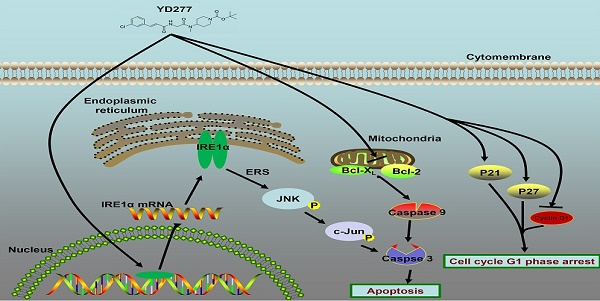当前位置:
X-MOL 学术
›
Theranostics
›
论文详情
Our official English website, www.x-mol.net, welcomes your
feedback! (Note: you will need to create a separate account there.)
Atg9b Deficiency Suppresses Autophagy and Potentiates Endoplasmic Reticulum Stress-Associated Hepatocyte Apoptosis in Hepatocarcinogenesis
Theranostics ( IF 12.4 ) Pub Date : 2017-06-02 , DOI: 10.7150/thno.18225 Ning Wang , Hor-Yue Tan , Sha Li , Yibin Feng
Theranostics ( IF 12.4 ) Pub Date : 2017-06-02 , DOI: 10.7150/thno.18225 Ning Wang , Hor-Yue Tan , Sha Li , Yibin Feng

|
The aim of this study was to investigate the mechanism underlying autophagy deficiency during hepatic carcinogenesis. For this purpose, we used choline-deficient, amino acid-defined (CDAA) hepatocarcinogenesis model in mice. miRNA microarrays combined with computational target predictions and GO analysis were used to identify molecular processes involved in carcinogenesis. PCR profiler array was employed to detect the dysregulated autophagy-related genes during carcinogenesis. We observed induction of hepatic tumours with increased inflammation, DNA damage, and cell death. These cellular processes were particularly detected upon oncogenic transformation of hepatocytes in which ER stress was excessively induced. Microarray combined with GO analysis showed that transformation of hepatocytes resulted in dysregulated events associated with cytoplasmic vesicle formation, which, in turn, was related to ER stress-induced autophagy. Defects of autophagy were observed in livers harbouring tumours and suffered a loss of expression of autophagy-related protein 9b (Atg9b). Hepatocytes lacking Atg9b were vulnerable to cell death induced by ER stress stimulus mainly caused by accumulation of ubiquitinated proteins. Loss of Atg9b also blocked recruitment of p62-associated ubiquitinated protein for autophagosome-lysosome degradation as Atg9b-driven phagophores may facilitate docking of both LC3 and p62 to initiate autophagy-associated degradation. miR-3091-3p from tumour-derived exosomes, which were internalised by hepatocytes, could suppress Atg9b expression. Observations from this study advance our knowledge about the regulation of autophagy during hepatocarcinogenesis.
中文翻译:

Atg9b缺乏抑制自噬并增强内质网应激相关的肝细胞凋亡在肝癌发生中的作用。
这项研究的目的是调查肝癌发生过程中自噬缺乏的潜在机制。为此,我们在小鼠中使用了胆碱缺乏,氨基酸定义(CDAA)的肝癌发生模型。miRNA微阵列与计算目标预测和GO分析相结合,用于鉴定参与致癌作用的分子过程。PCR Profiler阵列用于检测致癌过程中自噬相关基因的失调。我们观察到肝肿瘤的诱导与增加的炎症,DNA损伤和细胞死亡。这些细胞过程特别是在过度诱导内质网应激的肝细胞的致癌转化中检测到的。芯片与GO分析相结合表明,肝细胞的转化导致与细胞质囊泡形成相关的失调事件,这又与内质网应激诱导的自噬有关。在具有肿瘤的肝脏中观察到自噬缺陷,并且自噬相关蛋白9b(Atg9b)的表达丧失。缺乏Atg9b的肝细胞易受内质网应激刺激诱导的细胞死亡,内质网应激刺激主要是由泛素化蛋白的积累引起的。Atg9b的丢失也阻止了p62相关泛素化蛋白募集用于自噬体溶酶体降解,因为Atg9b驱动的噬菌体可能促进LC3和p62的对接以启动自噬相关降解。肿瘤来源的外泌体中的miR-3091-3p被肝细胞内在化,可以抑制Atg9b的表达。
更新日期:2017-08-02
中文翻译:

Atg9b缺乏抑制自噬并增强内质网应激相关的肝细胞凋亡在肝癌发生中的作用。
这项研究的目的是调查肝癌发生过程中自噬缺乏的潜在机制。为此,我们在小鼠中使用了胆碱缺乏,氨基酸定义(CDAA)的肝癌发生模型。miRNA微阵列与计算目标预测和GO分析相结合,用于鉴定参与致癌作用的分子过程。PCR Profiler阵列用于检测致癌过程中自噬相关基因的失调。我们观察到肝肿瘤的诱导与增加的炎症,DNA损伤和细胞死亡。这些细胞过程特别是在过度诱导内质网应激的肝细胞的致癌转化中检测到的。芯片与GO分析相结合表明,肝细胞的转化导致与细胞质囊泡形成相关的失调事件,这又与内质网应激诱导的自噬有关。在具有肿瘤的肝脏中观察到自噬缺陷,并且自噬相关蛋白9b(Atg9b)的表达丧失。缺乏Atg9b的肝细胞易受内质网应激刺激诱导的细胞死亡,内质网应激刺激主要是由泛素化蛋白的积累引起的。Atg9b的丢失也阻止了p62相关泛素化蛋白募集用于自噬体溶酶体降解,因为Atg9b驱动的噬菌体可能促进LC3和p62的对接以启动自噬相关降解。肿瘤来源的外泌体中的miR-3091-3p被肝细胞内在化,可以抑制Atg9b的表达。











































 京公网安备 11010802027423号
京公网安备 11010802027423号